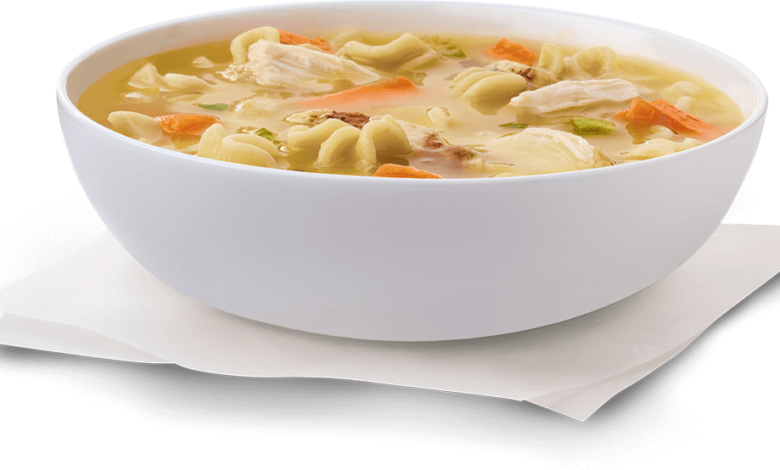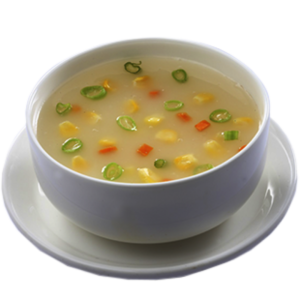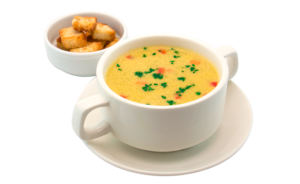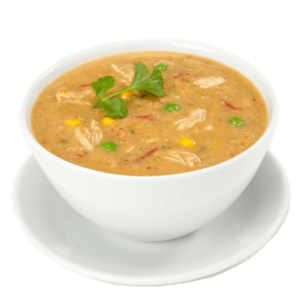How do describe chicken soup? What is the history of chicken soup?
Describe chicken soup

chicken soup:
Chicken soup is a popular, comforting dish that primarily consists of chicken, water or broth, vegetables, and often includes additional ingredients such as noodles, rice or various herbs and spices. It is widely consumed in different cultures around the world and is famous for its soothing and nutritious properties, especially during cold or flu season. Here is a typical description:
Basic ingredients:
Chicken: Chicken is a major source of protein and the main ingredient in chicken soup. It can be in the form of chicken pieces, with or without bones, or a whole chicken.
Broth or water: Soup is usually made with water or chicken broth. The broth adds flavor and richness to the soup.
Vegetable:
Onions: Often sauteed for flavor. Carrots: Sliced or diced carrots are a popular addition, adding natural sweetness and color.
Celery: Chopped celery is a traditional ingredient that imparts a delicate, earthy flavor.
Garlic: Adds flavor and aroma.
Spices and herbs:
Salt and pepper: basic spices to enhance flavor. Bay leaves: Often used to create a delicate herbal scent. Thyme, parsley, rosemary: common herbs used to enhance flavor and aroma. Additional Ingredients:
Noodles or rice: Optional but popular additions to make the soup richer and more filling. Vegetables: Other vegetables such as peas, spinach or potatoes can also be added depending on personal preference.
Preparation: Chicken is usually simmered in broth or water with vegetables and spices until the chicken is cooked and tender.
Once cooked, the chicken is taken out, shredded and put into the pot.
Noodles or rice are added and cooked until tender.
Part:

Chicken soup is often served hot, decorated with fresh herbs such as parsley.
It is often served as a complete meal, especially when containing chicken, vegetables and starchy foods such as noodles or rice. Many cultures believe in its ability to relieve cold symptoms, soothe sore throats, and provide comfort when sick. Whether loved for its flavor or comforting properties, chicken soup is a popular and versatile dish enjoyed by people of all ages.
What is the history of chicken soup?
Chicken soup has a rich history dating back thousands of years and has deep roots in many different cultures around the world.
Ancient Origin:
The concept of using chicken to make nutritious stocks and soups has been around for a long time. In ancient times, people often used available ingredients including chicken, herbs and vegetables to create simple but nutritious meals.
Medieval and Renaissance Europe:
Chicken soup emerged in medieval Europe. In the 12th century, famous Jewish scholar and physician Moses Maimonides praised the medicinal properties of chicken soup, emphasizing its ability to relieve symptoms of respiratory diseases.
During the Renaissance, chicken soup continued to be prized for its health benefits. It is often prepared with herbs and spices, which are believed to have medicinal properties.
Traditional medicine and folk culture:
In different cultures, chicken soup is considered a cure for colds, flu and common illnesses. Traditional Chinese medicine and other ancient healing systems often recommend chicken soup for its ability to strengthen the immune system and help recover from illness.
Jewish Penicillin:
In Jewish culture, chicken soup is sometimes called “Jewish penicillin” because of its widespread reputation for comforting and curative effects, especially in times of illness.
Traditional Jewish chicken soup, known as “Jewish penicillin”, often includes ingredients such as matzo balls or noodles, carrots and celery.
Modernization and universalization:
With the advent of modern culinary techniques and increased access to a variety of ingredients, chicken soup has evolved into a diverse range of recipes and variations.
In the 20th century, commercially prepared canned chicken soup became widely available, making it easier for people to enjoy this comforting dish.
Cultural variations:
Different cultures have their own versions of chicken soup. For example, in Asian cuisine, chicken soup is often made with additional spices such as ginger, garlic, and Asian herbs. In Mexican cuisine, “caldo de pollo” is a traditional chicken soup with a unique blend of flavors.
Throughout history, chicken soup has been prized not only for its flavor but also for its ability to provide nutrition, warmth, and comfort in times of illness or distress. Today, it remains a dish enjoyed by many people of many different cultures and backgrounds.

Benifits:
Chicken soup is not only a delicious and comforting dish, but it is also often touted as having health benefits, especially during times of illness. Here are some potential benefits associated with chicken soup:
Hydration: Chicken soup is mainly prepared with water or broth, which helps keep the body hydrated, especially in cases of illness that can cause dehydration due to fever, sweating or dehydration, and cravings.
Soothe your throat: Warm chicken soup can help soothe a sore throat and ease discomfort caused by a cold or respiratory infection. Heat and steam can soothe a sore throat.
Reduce nasal congestion: The steam from a bowl of hot chicken soup can help open your nasal passages, making it easier to breathe if you have a stuffy nose. Additionally, chicken soup ingredients such as garlic and onions may have a mild decongestant effect.
Rich in nutrients: Chicken soup often contains a variety of vegetables such as carrots, celery and onions, which provide vitamins, minerals and antioxidants necessary for the body’s immune function and overall health.
Protein and amino acids: Chicken, the main ingredient in chicken soup, is a source of high-quality protein and essential amino acids needed for tissue repair and immune function.

It is crucial to emphasize that, while chicken soup may have various potential benefits, it is not a replacement for medical therapy. If you are feeling ill or have a medical issue, it is critical to seek proper advice and treatment from a healthcare expert.


